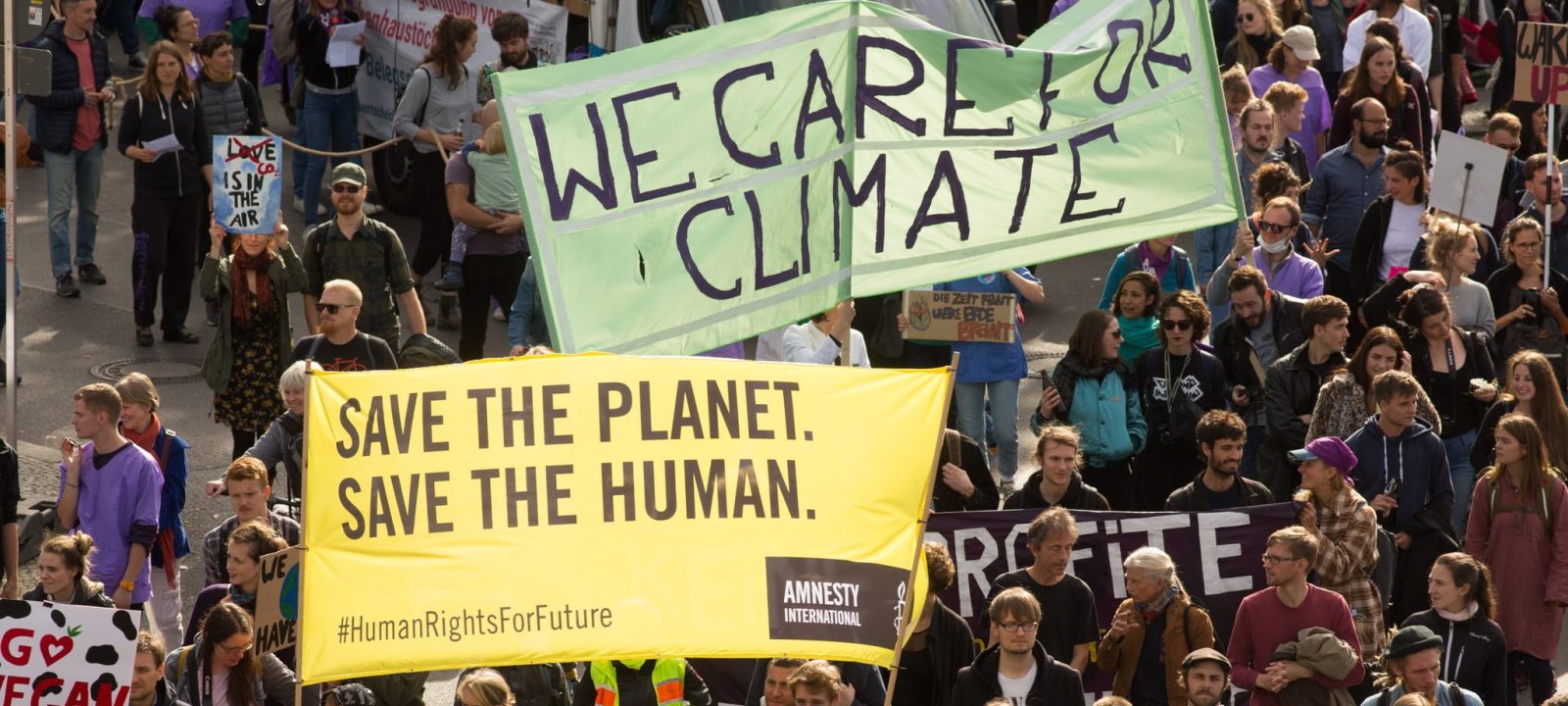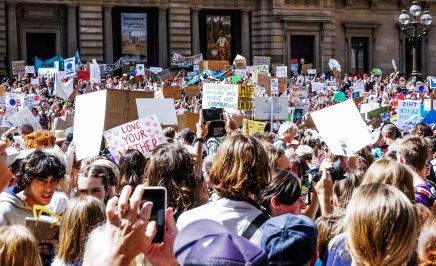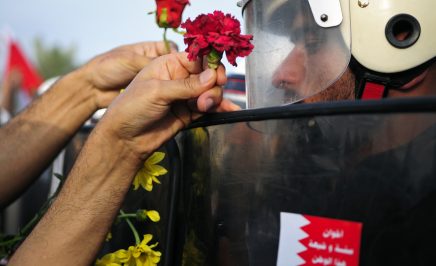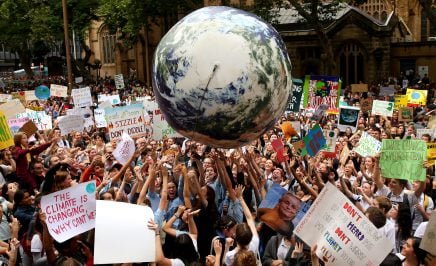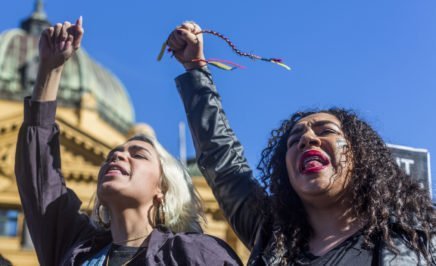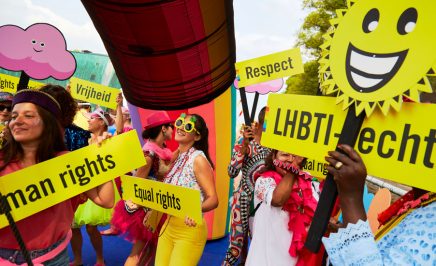As New South Wales opens up after months of lockdown and racegoers return to the track in their thousands, we’re taking a look at the ongoing restrictions being applied to the right to protest – restrictions that under the most recent NSW Government roadmap appear to be stuck at 30 people max.
The debate around protest has, in recent times, focused on demonstrations related to COVID-19 such as lockdown, mandating the vaccine rollout and vaccine passports. While the right to protest is a key freedom within a liberal democracy, it also has to be considered in the context of other rights such as the right to health, and as the Delta strain spread these demonstrations risked transmission of the virus.
But as vaccination rates rise, lockdown restrictions in NSW ease and people start looking forward to attending concerts, sporting events and packed Sydney beaches, will we also be allowed to attend protests?
Upcoming climate protests
In 2021, climate protesters all over the world are once again voicing their anger and frustration at the lack of action on reducing carbon emissions. Here in Australia, one of the great laggards on setting a target for zero emissions, people are rightly angry. And they want to express that anger.
But while some states are able to hold physical protests, in NSW the vague guidelines mean events are still being held online. Meanwhile, the lucrative Everest horse race, being held in Randwick tomorrow, has been given an exemption as a ticketed event with 10,000 people allowed to attend.
So when will the NSW Government allow us the right to freedom of peaceful assembly, expression and association as enshrined in international law? When will we be able to take to the streets to protest important issues again?
Under the current roadmap, unlimited outdoor gatherings are allowed on 1 December. By that time, COP 26 in Glasgow will have come and gone, and with it an opportunity for protesters to pressure the government to finally take action and protect the future. These are extremely important issues, where a lack of progress by our politicians frustrates many. We should be able to express those frustrations – and pressure for change – through peaceful protest.
The double standards are there for all to see and they coincide with the Federal Government’s latest efforts to stymie charities and not for profits who use protest as a means to campaign a cause.
Protest under Covid-19
According to Amnesty’s 2021 Human Rights Barometer report launched earlier this year, the vast majority of Australians supported the restrictions to protest through lockdown in order to protect our health. But away from crises like the pandemic, 70% of the population believe that the right to protest is important and should be protected.
The NSW Public Health Orders during the 2021 lockdown did not specifically address protest as a relevant activity or define ways in which protest could be carried out in COVID-safe ways. In effect, this meant all protests became prohibited for the duration of lockdown. This prohibition was enforced by NSW Police, who took a heavy-handed response to two small, COVID-safe protests observed by Legal Observers NSW.
On 1 August, 9 protesters were fined a total of $9000 at a COVID-Safe protest car convoy – all were wearing masks, in cars with people from the same household, and all stayed within their cars during the protest. Over 200 police officers, including members of the Public Order & Riot Squad and mounted police, were present at the protest. A number of protesters had driven the route prior to the protest without incident, but were allegedly stopped and fined within minutes of putting signs or chalk on their cars.
NSW Legal Observers also observed a COVID-safe protest on 11 September held in response to the harsh lockdown of the Common Grounds housing complex. Residents at Common Ground had asked those living within a 5km radius to show solidarity by wearing purple and exercising in a COVID-safe way outside the complex.
Police issued a move order to everyone near Common Grounds within 30 minutes of the protest beginning. Police issued one person a direction to return home because he was filming the police, compelled people to show their IDs, questioned people about their reasons for being there, issued multiple directions for people to “move on”, and warned people that “failure to comply is an offence”. Police also directed a resident of Common Ground, who was standing on her balcony, to “stop blowing bubbles”.
Concerningly, police also issued a “move on order” to two legal observers, told them they had no right to observe under the current restrictions, and took photographs of legal observers. Legal observers play an important role in ensuring that human rights are protected at protests, and have a right to be present at protests. Despite moving on when ordered, these two legal observers later received fines for failing to move on, which are the subject of ongoing review requests and a complaint against police.
Use of undue force
Elsewhere in the world, many people have also had good reason to protest – the death of Sarah Everard in England at the hands of a police officer brought people onto the streets in their thousands. In Myanmar, the overthrow of the government by the military has seen chaotic scenes and many deaths as civilians protested. Such protests have been greeted with overzealous police using an unnecessary level of force.
Amnesty International recently investigated the misuse of batons and other striking weapons, analysing illustrative incidents spanning the past decade from around the world. Examining hundreds of photos and videos, researchers have verified 188 incidents of the misuse of striking weapons including police batons, lathis (long sticks), sjamboks (rigid whips) and improvised weapons in 35 countries, covering all regions of the globe. These include examples from violent crackdowns of mass protests in countries as diverse as Belarus, Colombia, France, India and Myanmar.
Such use of force must only be resorted to with the utmost respect for the law and with due consideration for the serious impact it can have on a range of human rights: the right to life, to physical and mental integrity, to human dignity, to peaceful assembly, and to freedom of movement – to name just the ones most frequently affected.
Four guiding principles (legality, necessity, proportionality, and accountability) must govern any state action that impacts on the human rights of a person. Any use of police powers by law enforcement officials must comply with these principles; for example, when carrying out an arrest or a stop-and-search activity or when using force against an individual, or group of individuals.
The road ahead
The rights to freedom of peaceful assembly, expression and association are enshrined in international law. States are under an obligation to facilitate the right to freedom of peaceful assembly, actively encouraging people to engage in assemblies.
States must respect, protect, and fulfil the right to peaceful assembly without discrimination of any kind. Peaceful assemblies should be protected, and they do not lose their peaceful character if there are isolated acts of violence or unlawful behaviour by some individuals.
The exercise of this right should not be dependent on the authorisation of the state; states may request notice (although not for spontaneous assemblies) – but not authorisation.
Protest has been a vital tool to encourage reform for issues throughout our history, such as the right to vote and marriage equality.
The lockdowns have been necessary and have done their job, ensuring public health was protected as much as possible against the pandemic. However, as the public emerges post-lockdown, the Government must now turn its attention to assisting us in exercising our rights to freedom of assembly and expression.
How you can take action today
- Call for New South Wales police to respect the right to peacefully assembly – and end their use of excessive force to break up peaceful protests. Sign the petition here.
- Call for the Australian Government to increase its support to people facing the impacts of the climate crisis ahead of the COP26. Sign the petition here.
When courageous people protest, they make the world a better place. We must protect the right to protest wherever it is restricted and whenever it is at risk.
For Write for Rights 2022, we are taking action for brave individuals from 10 different countries, who have all paid a great price for speaking truth to power. We run Write for Rights every year because it works – real change happens when ordinary people come together to take action.
Learn more about Write for Rights. Write a letter, change a life – including yours.
